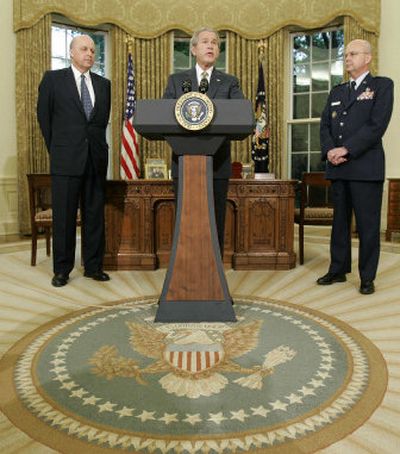Bush vows civilian for CIA’s No. 2

WASHINGTON – The White House moved quickly Monday to defuse concern over the nomination of Gen. Michael V. Hayden for CIA director, promising to balance the leadership of the nation’s premier civilian spy agency with a well-known and popular veteran of the organization in the No. 2 position.
In a highly unorthodox move, the White House disclosed the plan shortly after President Bush’s announcement of Hayden’s nomination in the Oval Office in hopes of reassuring those worried about too much military influence over the intelligence community.
Under the plan, Vice Adm. Albert M. Calland III would be replaced as deputy director by retired CIA official Stephen R. Kappes, who quit in November 2004 in a dispute with then-Director Porter J. Goss.
The move was seen as a repudiation of Goss’ leadership and an olive branch to CIA veterans disaffected by his 18-month tenure, during which many other senior officials followed Kappes out the door. The White House was so eager to get out the news of Kappes’ likely appointment that it was announced from the lectern in the briefing room, even though the Senate must confirm Hayden and Kappes has not yet been officially nominated.
Other Goss lieutenants at the agency also appear to be on the way out, following Goss, who resigned Friday. Kyle “Dusty” Foggo, brought in by Goss as the agency’s executive director, announced to agency staff in an e-mail yesterday that he plans to resign. The FBI said it is investigating whether Foggo steered contracts to a friend, contractor Brent R. Wilkes. The CIA confirmed last week that Foggo attended poker games with Wilkes at a Washington hotel.
The moves are part of a concerted effort by the president’s team to recover ground after several key Republicans expressed reservations about Hayden’s nomination over the weekend, citing his military background and involvement in warrantless domestic surveillance. Most damaging to the White House was criticism by Rep. Peter Hoekstra, R-Mich., the House intelligence committee chairman, who called Hayden “the wrong man at the wrong place at the wrong time.”
Without naming Hoekstra, Bush appeared to directly rebut him Monday while appearing with Hayden before cameras in the Oval Office. “He’s the right man to lead the CIA at this critical moment in our nation’s history,” Bush said.
Bush also reached out to the skeptical CIA work force, which has gone through years of tumult since the failure to stop the Sept. 11, 2001, attacks and the flawed assessments of Iraq’s weapons programs. “In Mike Hayden, the men and women of the CIA will have a strong leader who will support them,” Bush said.
Hayden, wearing a pressed blue Air Force uniform with four stars on the shoulders, also tried to reassure the civilian spies.
“If confirmed, I would be honored to join you and work with so many good friends,” he said. “Your achievements are frequently underappreciated and hidden from the public eye, but you know what you do to protect the republic.”
But Hayden, the deputy national intelligence director and former head of the National Security Agency, declined to retire his military commission, as several senators from both parties recommended. “That is not his intention at this particular time,” John D. Negroponte, director of national intelligence, said at a briefing.
The CIA has had several military officers as its director, but none in the past 25 years, and Hayden’s nomination comes at a time when Defense Secretary Donald H. Rumsfeld has moved aggressively to expand the Pentagon’s intelligence operations. Hayden’s nomination has also reignited debate over the legality of the NSA’s secret eavesdropping without court approval on telephone calls and e-mail between the United States and overseas in cases when one participant is suspected of terrorist ties.
Despite the concerns expressed by some lawmakers over the weekend, Hayden received a warm reception Monday in the place it matters most – the Senate intelligence committee, which will handle his confirmation hearings. Committee Republicans either fully embraced him or, at worst, reserved judgment, and a key Democrat said she expects to support Hayden and assumes he will be confirmed.
“He’s going to surround himself with professional people,” Sen. Dianne Feinstein, D-Calif., told reporters. “The Gosslings are going,” she added, referring to Goss’s close coterie of aides installed at Langley.
“Rumsfeld wanted to control the NSA, and to his credit Hayden stood up.”